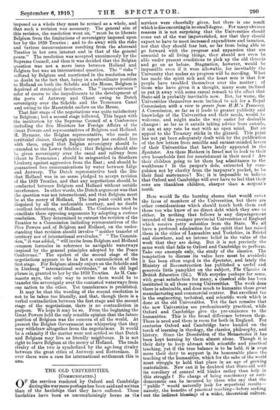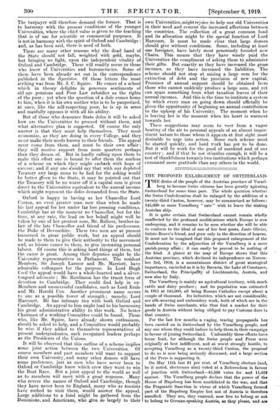THE OLD UNIVERSITIES. [COMMUNICATED.] d'AF the services rendered by Oxford
and Cambridge ‘,./ during the warmore perhaps has been said and written than of the hardships that they have suffered. These hardships have been as uncomplainingly borne as the services were cheerfully given, but there is one result which is disconcerting in no small degree. For many obvious reasons it is not surprising that the Universities should come out of the war impoverished, nor that they should expect to have to meet increased expenditure and taxation, nor that they should fear lest, so far from being able to go forward with the progress and expansion that are essential to all living things, they should not even be able under present conditions to pick up the old threads and go on as before. Stagnation, however, would be impossible even if it were allowable, for inevitably the University that makes no progress will be receding. What has made the spirit sick and the heart sore is that few people have troubled themselves over the matter : of those who have given it a thought, many seem inclined to put it away with some casual remark to the effect that State-aid is probably inevitable now. But, far worse, the Universities themselves seem inclined to ask for a Royal Commission with a view to grants from H.M.'s Treasury. A Commission, so far as it leads to greater publicity and knowledge of the Universities and their needs, would be welcome, and might make the way easier for desirable changes : so far as it entails taking advice from outside, it can at any rate be met with an open mind. But an appeal to the Treasury sticks in the gizzard. This point has not yet been adequately dealt with by the publication of the few letters from sensible and earnest-minded lovers of their Universities that have lately appeared in the Spectator. Are these Mothers in Israel not to look to their own households first for nourishment in their need ? Are their children going to let them beg admittance to the workhouse ? Is the pauper's dole, extracted by com- pulsion not by charity from the taxpayer's pocket to be their final sustenance? No; it is impossible to believe that Oxford and Cambridge will over have to feel that their sons are thankless children, sharper than a serpent's tooth.
Here would lie the burning shame that would cover the faces of members of the Universities, but there are other considerations which should touch both them and those too who know of no direct debt which they owe to either. In nothing that follows is any disparagement intended of the younger provincial Universities of England which receive petty subsidies from the State. We all have a profound admiration for the spirit that has raised .them in the cities of Lancashire and Yorkshire, in Bristol and elsewhere, and an intense belief in the value of the work that they are doing. But it is not precisely the same work that falls to Oxford and Cambridge to perform. Take one example only, the study of the classics. The temptation to discuss its value here must be avoided: it has been often urged in the Spectator, and lately the Ministry of Reconstruction has published a useful and generous little pamphlet on the subject, The Classics in British Education (2d.). With surprise perhaps for some, with great satisfaction for many, ,a classical side has been instituted in all these young Universities. The work done there is admirable, and does much to humanize those great manufacturing and commercial centres. But excellent too is the engineering, technical, and scientific work which is done at the old Universities. Yet the fact remains that the new Universities are predominantly practical, while Oxford and Cambridge give the pre-eminence to the humanities. 'This is the broad difference between thepi. There is need and there is room for both in England. For centuries Oxford and Cambridge have handed on the torch of learning in theology, the claseics, philosophy, and history. Since the Dissolution of the Monasteries it has been kept burning by them almost alone. 'Though it is their duty to keep abreast with scientific and practical teaching, yet if the true balance is to be held, it is even more their duty to support in its honourable place the teaching of the humanities, which for the sake of the world must struggle to hold that place in an age of growing materialism. Now can it be doubted that State-aid with its corollary of control will hinder rather than help in this struggle I No charge of being reactionary or anti- democratic can be incurred by those who say that the " public " would naturally look for superficial results— namely, the benefits of practical teaching—before seeking out the indirect ble.seings of a wider, theoretical culture. The taxpayer will therefore demand the former. That is in harmony with the present conditions of the younger Universities, where the chief value is given to the teaching that is of use for scientific or commercial purposes. It is not in harmony with the spirit of Oxford and Cambridge : and, as has been said, there is need of both.
There are many other reasons why the dead hand of the State should not fall, weighted with gold, maybe, but bringing no light, upon the independent vitality of, Oxford and Cambridge. These will readily occur to those who know of Universities and bureaucracies. Some of them have been already set out in the correspondence published in the Spectator. Of these letters the most striking was from Mr. J. C. Squire. He comes of a school which in theory delights in generous sentiments of old age pensions and Poor Law subsidies as the rights of the poor ; yet when the question of a dole comes home to him, when it is his own mother who is to be pauperized, at once, like the self-respecting poor, he is up in arms and manfully opposes it with all his ability.
But of those who denounce State doles it will be asked how are the Universities to proceed without them, and what alternative plan is suggested. Of course the only answer is that they must help themselves. They must economize, as they are doing in every College, and they must make their needs known to their friends. The appeal must come from them, and must be their own affair : they will receive support from more quarters perhaps than they dream of. But in loudly calling upon them to make this effort one is bound to offer them the nucleus of a scheme on which they might embark with hope of success; and if any one should say that with our depleted Treasury any large sums to be had for the asking would be better given to the State, it may be pointed out that the Treasury will be no worse off if a capital sum is given direct to the Universities equivalent to the annual income which might represent the doles demanded from the State.
Oxford is happy in having as her Chancellor Lord Curzon, an even greater man now than when he made his last appeal for her under far less pressing conditions. Cambridge has at the moment no Chancellor, but for the time, at any rate, the lead on her behalf might well be -Wren by one of her greatest sons, Mr. Balfour, brother-in- law of the late Chancellor and friend of his predecessor, the Duke of Devonshire. These two men are at present immersed in great public work, but an appeal should, be made to them to give their authority to the movement and, as leisure comes to them, to give increasing personal labour. Of course this is asking hard things of them, but the cause is great. Among their deputies might be the University representatives in Parliament. The resident Members, Sir Joseph Larmor and Mr. Marriott, have admirable colleagues for the purpose. In Lord Hugh Cecil the appeal would have a whole-hearted and a silver- tongued advocate : Mr. Rawlinson has the truest form of devotion to Cambridge. They could find help in ex- Members and unsuccessful candidates, such as Lord Ernie and Mr. Harold Cox. Another prominent name occurs to one as a possible tower of strength ; namely, Lord Harcourt. He has intimate ties with both Oxford and Cambridge. An appeal to him might lead to his harnessing his great administrative ability to this work. No better Chairman of a working Committee could be found. Those who, like Mr. Squire, have already shown enthusiasm, should be asked to help, and a Committee would probably be wise if they added to themselves representatives of present undergraduates, such recognized leaders perhaps as the Presidents of the Unions.
It will be observed that this outline of a scheme implies some joint action between the two Universities. Of course members and past members will want to support their own University, and many other donors will have some preference, just as men who have never been to Oxford or Cambridge know which crew they want to win the Boat Race. But a joint appeal to the world as well as to members will meet with a great response. Many who revere the names of Oxford and Cambridge, though they have never been to England, many who as tourists have rushed to visit them, would answer the appeal. Large additions to a fund might be gathered from the Dominions. and Americans, who give so largely to their own Universities, mi ght rejoice to help our old Universities in their need and cement the increased affections between the countries. The collection of a great common fund and its allocation might be the special function of Lord Harcourt. It must be made clear that large donors should give without conditions. Some, including at least one foreigner, have lately most generously founded new Chairs. This means that they have wisely paid the Universities the compliment of asking them to administer their gifts. But exactly as they have increased the gross incomes, so they have increased the liabilities. The scheme should not stop at raising a large sum for the extinction of debt and the provision of new capital. Promises of annual support should .be obtained from those who cannot suddenly produce a large sum, and yet can spare something from what taxation leaves of their annual incomes. And this is the time to institute a system by which every man on going down should officially be given the opportunity of beginning an annual contribution to the upkeep of his University. The moment when lie is leaving her is the moment when his heart is warmest towards her.
These suggestions may seem to veer from a vague beating of the air to personal appeals of an almost imper- tinent nature to those whom it appears at first sight most desirable to urge into action. Some such scheme must be started quickly. and hard work has got to be done. But it will he work for the good of mankind and of our country ; and if that be not stimulus enough. it will be a test of thankfulness towards two institutions which perhaps command more gratitude than any others in the world.



































 Previous page
Previous page